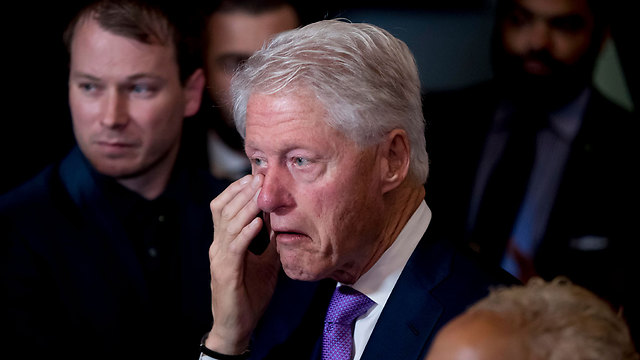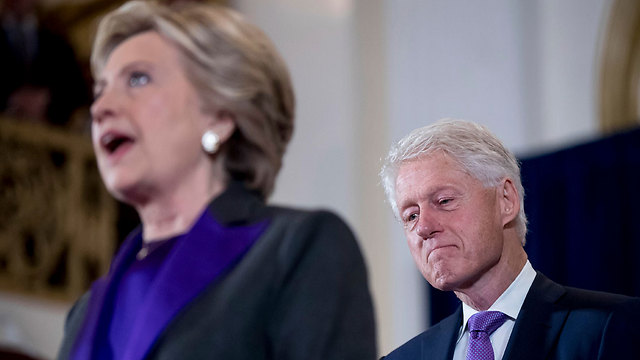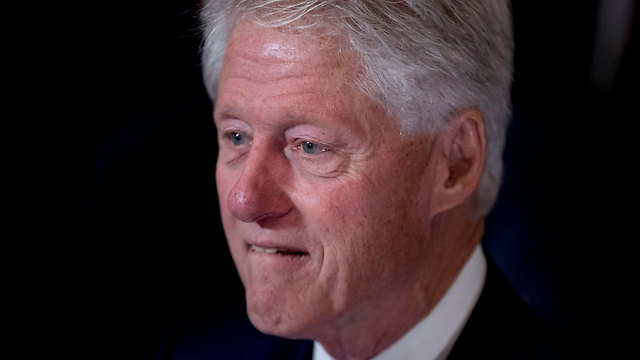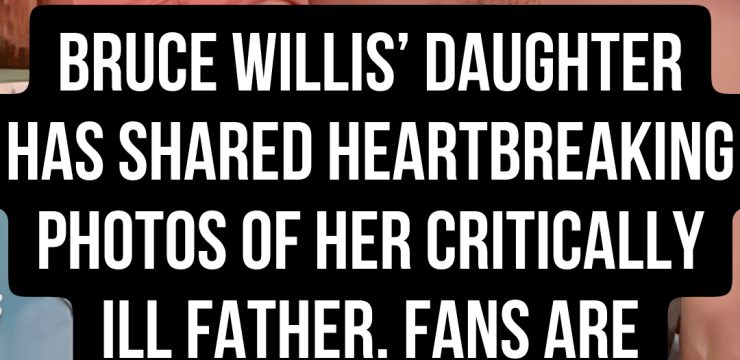Former President Bill Clinton appeared before the nation today, his eyes filled with visible tears, as he stood in front of countless cameras to deliver a message that left the entire country stunned and heartbroken. His voice, which had always commanded authority and reassurance, wavered with a fragile tremble that was impossible to ignore. Every few sentences, he paused, struggling to compose himself, taking in a shaky breath before continuing. The magnitude of the moment was palpable, and it was clear to everyone watching that this was not just a routine public address, but rather one of the most emotionally charged moments in recent memory. The depth of sorrow in his expression, the heaviness in his tone, and the vulnerability in his demeanor revealed a man who had faced countless battles in his life, both in office and in private, but who was now confronting one of the hardest moments he had ever experienced.

As he stood there, the former president tried to summon the composure that had seen him through countless political storms, yet today it was different. Today, the armor of politics, experience, and public speaking seemed to have fallen away, leaving behind a man who was struggling to navigate a deeply personal loss. Clinton spoke with a sense of raw honesty rarely seen in public figures, letting his guard down in front of millions. He spoke carefully, each word weighed down with significance, ensuring that the importance of his message could not be misunderstood. It was clear this wasn’t about politics, partisanship, or history—it was about something that had shaken him to his core as a human being.
In a voice that trembled but never faltered in purpose, he explained the sheer seriousness of what had unfolded. Clinton made it known that this news reached far beyond the boundaries of politics and touched something much deeper, something rooted in personal connection and profound sorrow. Those who had grown used to seeing him exude charm and unwavering confidence now witnessed a completely different side of him—a side marked by raw emotion, unfiltered vulnerability, and sincere regret. The man known for captivating speeches and powerful rhetoric found himself grasping for words, often staring down at his notes, his brow furrowed, trying to convey emotions that no words could fully capture.
The room where he spoke was consumed by a heavy silence. Reporters, advisors, and staffers who had gathered found themselves holding their breath, eyes moist with emotion. The usual hustle of flashing cameras and scribbling pens was replaced by an almost sacred stillness. Every person present knew they were witnessing a defining moment, a historic speech that would etch itself into the memories of Americans for years to come. The occasional soft sob could be heard from those closest to the podium, a quiet acknowledgment of shared grief, of collective sorrow that transcended political lines.
As Clinton pressed on, his words shifted from sharing personal pain to addressing the broader impact this tragic news would have on the nation and the world beyond its borders. He talked about the ripple effects that would spread across communities, institutions, and international relationships. With the weight of his words, he reminded people of the challenges that lay ahead, of the difficult conversations that would need to be had, and of the healing that would take time and patience. Yet, amidst his sadness, there was still a flicker of the leader within him—a leader who, even in his own grief, found the strength to offer comfort and guidance to his people.
His tone softened as he spoke of unity, of standing together as one nation despite political differences, personal disagreements, and societal divides. He urged Americans to lean on each other, to show compassion in a time when it was needed most, and to rediscover the humanity that binds them all together. Clinton made it clear that this was a moment not to retreat into isolation or anger, but to rise above individual sorrow and become a collective force of support and resilience. He reflected on the strength of the American spirit, the courage of its people, and the enduring hope that has guided the country through countless dark chapters of its history.
His message wasn’t just one of grief but of resilience. He reminded everyone watching that even in the face of unimaginable sadness, even in the midst of personal and national heartbreak, there was always a path forward. There was always hope to hold onto, always a future to build together, and always a chance to turn pain into progress. The former president called for understanding—not just toward those directly affected by the tragedy but toward each other as citizens of the same nation. His voice, though fragile, carried a quiet power, one that echoed through every home, every community, every heart that tuned in to hear his words.

As his speech drew to a close, Clinton paused one final time, his chest rising and falling with deep, steadying breaths. He reached up to wipe a tear from his cheek, a small but significant gesture that revealed the immense weight he had been carrying. There was a profound stillness in the room, a silence born out of mutual respect and somber reflection. Reporters who had come prepared with questions found themselves unable to break the quiet. Cameras zoomed in, capturing every nuance of his expression, every subtle sign of the deep personal struggle he was enduring.
As he delivered his final words, Clinton expressed a heartfelt wish for healing and understanding. He thanked those who had stood by him, those who continued to support one another, and those who would now step forward to help the nation navigate through this painful chapter. He promised that even though his official duties had long since ended, his heart remained tied to the wellbeing of the country and its people. He assured the public that he would continue to serve in whatever capacity he could, offering his voice, his experience, and his compassion to help others find light through the darkness.
When the last words left his lips, Clinton stepped back from the podium, his shoulders slumped in exhaustion, his spirit clearly worn but not broken. The room slowly came back to life with quiet murmurs as journalists attempted to process the magnitude of what they had just witnessed. The former president gave a final glance to the crowd, his eyes reflecting both sorrow and a flickering hope, before he turned and exited, leaving behind a room filled with emotion and a nation grappling with collective grief.

Outside, the world seemed to pause. People stopped in their tracks, televisions remained tuned in, and conversations centered around the heartbreaking announcement. It was a moment that transcended politics, transcended headlines, and touched the core of what it meant to be human. For days, perhaps weeks, the country would reflect on Clinton’s words, revisit the footage, and engage in difficult but necessary dialogue about the future. His appearance reminded everyone that even those who once held the highest office in the land are not immune to sorrow, to personal tragedy, to the profound weight of loss.
This day became one etched into the fabric of American history, not because of political controversy or legislative battles, but because of raw humanity on display. Clinton’s vulnerability reminded millions of the importance of empathy, of kindness, of supporting one another through difficult times. His speech served as a call to action—not through legislation, but through human decency. Long after the cameras had been turned off and the reporters had filed their stories, his words continued to echo across the country, inspiring people to be better, to love harder, and to hold on to hope, even in moments when it feels impossible to do so.





